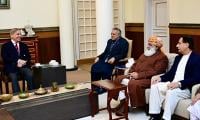ISLAMABAD: Afghanistan's Minister of Foreign Affairs Mohammad Hanif Atmar has sought Pakistan's help to end the raging conflict in Afghanistan, saying that he hoped Islamabad would persuade the Taliban to return to talks again.
The situation in Afghanistan has taken a turn for the worse, with the Taliban launching a blistering campaign and capturing key districts of the country, drastically emboldened as the US and other foreign forces gear up to leave the country.
In an exclusive interview with Geo News, Atmar said Kabul had great expectations from Pakistan. "We are hopeful Pakistan will help Afghanistan disrupt the Taliban’s supply and brutal campaign," said the Afghan minister.
In response to a question about whether the Afghan government thinks the US betrayed it, Atmar said that Washington signed an agreement with the Taliban with honest intentions.
"The Taliban did not fulfil their part of the deal and deceived the whole world," he said.
"The Taliban are making a huge mistake. All of us have extended a hand of friendship towards them," he added.
Atmar said the Afghan government was telling the Taliban to honour the Doha peace deal, adding that Kabul had fulfilled its obligations of the deal when it came to the prisoners exchange and ensuring foreign troops leave the country. He said the Tehreek-e-Taliban Pakistan (TTP) and al-Qaeda have banded forces with other terrorist elements and are fighting alongside the Taliban against the government of Afghanistan.
"We are monitoring links between the TTP, Taliban and al-Qaeda on a daily basis," said Atmar. "These ties certainly exist."
The Afghan foreign minister said these 'elements' were fighting against the "government and people of Afghanistan" alongside the Taliban, adding that these elements were fighting the Afghanistan government in Badakhshan, Kunduz, Faryab and other provinces of the war-torn country.
Speaking about the militants, Atmar said the Afghan government has divided these groups of foreign fighters into three categories.
"The first among themare the [militant groups] that are fighting for a global agenda, such as al-Qaeda and Daesh," he said. "Al-Qaeda and Daesh militants have been present in the region where Pakistan and Afghanistan are situated," he added.
Atmar said his government was aware of the locations in Pakistan and Afghanistan where al-Qaeda members were killed and arrested.
"Then, we have regional players," the Afghan minister said. "[These include] the TTP, Lashkar-e-Tayyaba, Jaish-e-Mohammad, Islamic Movement of Uzbekistan, ITIM, the Ansarullah and Jundullah are also fighting with them [Taliban]," he added.
"The entire region, not Afghanistan alone, is at threat from these groups," he stressed.
"Pakistan, Afghanistan, China, India, Russia and the Middle East are in danger from these groups," he said.
Atmar said the government of Afghanistan spoke about regional cooperation as "there are no good or bad terrorists and they all are the same".
"Peace between Afghanistan and the Taliban will ensure these elements do not find a safe haven in Afghanistan," he added.
Meanwhile, Foreign Minister Shah Mahmood Qureshi on said the strengthening of the ranks of the banned TTP was not in the interest of Pakistan, and it would not favour any sort of Talibanisation.
“The comeback of TTP is not in Pakistan’s interest. We do not want Talibanisation of our country,” the minister said in his remarks at the meeting of the Senate’s Standing Committee on Foreign Affairs here at the Parliament House.
The Foreign Affairs Committee of the Senate held its meeting on Friday with its Chairperson Senator Sherry Rehman in the chair. The committee was given a detailed briefing by Shah Mahmood Qureshi who said Pakistan wants peace and stability in the region. National Security Adviser Moeed Yusuf attended the meeting as a special invitee, and briefed the committee on the options and security prospects Pakistan faces.
Moeed Yousaf said the situation in Afghanistan is not good and that Pakistan does not have control over things happening there.
“If there is no peace in Afghanistan, there wouldn't be peace in Pakistan either,” he said.
Shah Mahmood Qureshi expressed concern over the chances of breaking out a civil war after the pullout of military forces from Afghanistan and said Pakistan did not want such a scenario to repeat. He stressed that “power-sharing” of different Afghan factions was the best option to avert a civil war. He said those who used to point fingers at us are now saying that our objective is same, that is, peace and stability in Afghanistan.
He said the United States is saying that Pakistan is our constructive partner and Pakistan and US have same destination in Afghanistan. “Thirdly, they did not want to see Pakistan only from the Prism of Afghanistan,” he said.
Qureshi said the United States wants the withdrawal from Afghanistan be completed by August 31, but maintain a peaceful relationship with Pakistan and the region. He said today, the whole world is recognising Pakistan’s position that there is no military solution to the Afghanistan and Prime Minister Imran Khan was saying since long.
The minister said Pakistan wanted that withdrawal should be in such way that no negative force could take advantage. “We wanted the withdrawal and the Afghan peace process to go side by side,” he said.
Shah Mahmood said Afghan President Ashraf Ghani is ready to sit with the Taliban but the Taliban have objections against him. He said the Taliban's dress is simple but they are very intelligent and capable people, and have now become very intelligent. “They understand everything. The Taliban have changed since the Doha talks and Pakistan will have to prepare for a new situation,” he said.
The minister said today, Pakistan's role in the Doha accord and intra-Afghan talks is being appreciated and the Taliban promised not to attack during the withdrawal and adhered to the agreement, which the US recognises. He said Pakistan intended to suggest power sharing in Afghanistan to avoid civil war.
“In case of a civil war in Afghanistan, Pakistan would not be able to handle the influx of refugees,” he said.
Qureshi said India is undermining the Afghan peace process because the insurgency in Afghanistan is in its interest. “India wants instability in Pakistan and Afghanistan. It has informed the US, Europe and other countries about this. Why would those who made billions of dollars from the Afghan war make peace?” he said.
Qureshi said that India was sabotaging the Afghan reconciliation process, apparently investing money in the name of rebuilding Afghanistan, but had opened a front against Pakistan.
He said Pakistan is learning from the past and strategizing for the future. “We have met leaders of different ethnic groups and have no favourites in Afghanistan,” he said.
Qureshi said Pakistan desired an honourable return of the Afghan refugees, which he said, should be made part of the Afghan peace process.
Moeed Yousaf said Pakistan is devising a strategy for the country's future, adding that the government is planning to connect with the world in terms of development, partnership, and regional peace.
The national security adviser also briefed the forum about the security measures that the government is taking for Pakistan in terms of border security, and said that a special visa policy has also been formulated for Afghanistan.
Meanwhile, Shah Mahmood Qureshi received a telephone call from US Secretary of State Antony J Blinken, wherein the two sides stressed the need for continuing close coordination and cooperation to ensure meaningful progress in the Afghan peace process.
Both the sides discussed bilateral relations and important developments in the region, according to Foreign Office. On bilateral relations, the foreign minister emphasised Pakistan’s commitment to forging a broad-based, long-term and sustainable relationship with the United States that was anchored in deep economic cooperation, regional connectivity and peace in the region. He highlighted Pakistan’s focus on geo-economics as per the vision of Prime Minister Imran Khan and reiterated the importance of enhancing economic, trade and investment ties between Pakistan and the US.
US State Department Spokesman Ned Price, in a statement in Washington, said the two leaders "underscored the shared desire for a stable and sustainable bilateral relationship.
"The Secretary and the Foreign Minister discussed the importance of continued US-Pakistan cooperation on the Afghanistan peace process following the visit to the US by Afghan President (Ashraf) Ghani and Chairman (Abdullah) Abdullah."
Meanwhile, the Taliban said they now control 85 percent of Afghanistan´s territory as the militants mount an offensive amid a US military withdrawal, though the group´s claims cannot be independently verified.
At a press conference in Moscow, Taliban negotiator Shahabuddin Delawar said that "85 percent of Afghanistan´s territory" is under the group´s control, including some 250 of the country´s 398 districts.
"All administrative bodies and hospitals continue their work on this territory. We ensured their functionality," he said, calling on international organisations "not to interrupt their missions."
Delawar said that the US withdrawal was a result of the Taliban bringing Afghanistan´s population over to its side under the "principle of Islam".
"The United States was forced to leave our territory," he said.
He added that there was no agreement with the United States for the Taliban not to attack administrative centres remaining under Kabul´s control.
"These are our internal affairs," Delawar said.
This week more than 1,000 Afghan troops fled into Tajikistan after a blistering offensive by the Taliban in the north of Afghanistan. Afghan authorities have vowed to retake all the districts lost to the insurgents and deployed hundreds of commandos to counter their offensive in the north.
Moscow is closely watching the offensive, concerned about the security of Central Asian countries where it maintains military bases.
Russian foreign ministry spokeswoman Maria Zakharova said Friday that the Taliban "currently control about two-thirds" of Afghanistan´s border with ex-Soviet Tajikistan.
On Thursday, a Taliban delegation in Moscow met with the Kremlin´s envoy for Afghanistan, Zamir Kabulov, while the Russian foreign ministry released a statement saying that it had received assurances Central Asian borders would not be violated.
Meanwhile, the Taliban said they had captured Afghanistan´s biggest border crossing with Iran, as the insurgents continued a blistering offensive across the country.
"The port of Islam Qala is now under our full control and we will try to put it back in operation today," Zabihullah Mujahid, a spokesman for the insurgents, told AFP.
There was no immediate confirmation of the border crossing´s fall from the government, and the Taliban´s claim could not be independently verified.
Islam Qala is one of the major ports in Afghanistan, through which Kabul conducts most of its official trade with Iran. It is the second key border crossing the insurgents have captured since they launched a sweeping offensive in early May as US-led foreign forces began their final withdrawal.
Justice Abdul Shakoor Paracha fixes hearing on December 24 regarding Islamabad constituencies
Police made one arrest after vehicle drove “at least 400 metres across the Christmas market”
Incident occurred when couple, along with their child, was travelling in their car
Congress party dismisses incident as political gimmick
"I am sure once negotiations start, things will move forward," says NA speaker
Discussion focuses on enhancing governance, accountability and functional autonomy within police







